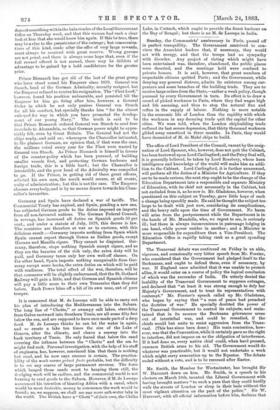The Transvaal debate was continued on Friday in an able,.
vigorous, and occasionally very bitter speech from Mr. Forster,. who considered that the Government had pledged itself to the- Bechuanas, and ought to defend them, even if necessary, by war. If England once admitted that it was unable to protect- allies, it would enter on a course of policy the logical conclusion of which was the surrender of India. He utterly denied the• inability of the Transvaal Government to suppress outrages,. and declared that " at least it was strong enough to defy her Majesty's Government, and to treat its representatives with- contempt." Mr. Forster's speech called up Mr. Gladstone,. who began by saying that " a man of peace had preached the doctrine of war." He specially doubted the power of- the Transvaal Government to control its subjects, and main- tained that in its essence the Bechuana grievances arose- out of intertribal war, and could be remedied, if the- chiefs would but unite to resist aggression from the Trans- vaal. (This has since been done.) His main contention, how- ever, was that the Convention, while it certainly gave us the right. to interfere, Aid not impose on us the obligation of interference.. If it had done so, every native chief could, when hard pressed,. summon British arms to his aid. The Government would do- whatever was practicable, but it would not undertake a work which might carry annexation up to the Equator. The debate ended without a vote, and is to be resumed after Easter.


































 Previous page
Previous page